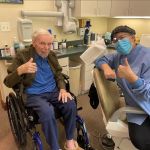Understanding and Handling Oral Cancer Screenings for Older Adults
As we age, the importance of health screenings becomes even more evident. A few years ago, my elderly father went for his regular dental check-up, and his dentist recommended an oral cancer screening. At first, I wasn’t sure about the need for it, especially because my father didn’t show any symptoms. But after learning more about the risks and the importance of early detection, I realized that oral cancer screenings are crucial for older adults. In this article, I’ll share my insights on how to approach oral cancer screenings for seniors, why they are necessary, and how they can potentially save lives.
1. The Importance of Oral Cancer Screenings for Older Adults
Oral cancer is one of the lesser-discussed cancers, yet it is a major health risk, particularly for older adults. I had no idea until I learned that the risk of developing oral cancer increases with age, especially for those over the age of 60. Tobacco use, heavy alcohol consumption, and a history of HPV (Human Papillomavirus) infection are common risk factors. Older adults may also be less likely to seek dental care regularly, which is why oral cancer screenings can often go unnoticed unless specifically asked for by a healthcare provider.
Oral cancer screenings are simple and painless but can make a significant difference in detecting cancer early when treatment is more effective. I’ve come to understand that the screening process involves examining the mouth, lips, tongue, and throat for any unusual growths, lumps, or changes that could indicate the presence of cancer. During the process, the dentist or healthcare provider may also feel for any abnormalities in the neck and jaw areas.
2. When Should Oral Cancer Screenings Be Conducted for Older Adults?
Oral cancer screenings should be part of regular dental check-ups, especially for older adults who have increased risk factors. I remember being surprised when my father’s dentist suggested it, even though he didn’t have any visible symptoms. But after discussing with the dentist, I understood that oral cancer can develop without causing noticeable pain or symptoms in the early stages.
Generally, oral cancer screenings are recommended for individuals over the age of 60, especially those with a history of smoking, alcohol consumption, or HPV. However, many experts, including those in my father’s dental office, recommend starting screenings earlier, even in your 40s or 50s, particularly if you have risk factors. It’s always a good idea to ask your dentist about the recommended frequency of screenings, but for most older adults, annual screenings are ideal.
3. What Happens During an Oral Cancer Screening?
During an oral cancer screening, the dentist will typically begin by taking a detailed medical history to understand any risk factors. I was relieved to know that the actual screening procedure is non-invasive and takes only a few minutes. The dentist will check for unusual bumps or sores in the mouth, and may gently press around the neck and jaw to check for lumps. They’ll also inspect the back of the throat and tongue, areas that can sometimes harbor early signs of oral cancer that are hard to see with the naked eye.
If the dentist identifies any areas of concern, they may recommend further testing, such as a biopsy or imaging. This was the case with my father, who, after his screening, was referred for further testing. Luckily, it turned out to be a benign condition, but the whole experience highlighted how crucial it is to catch any potential issues early.
4. How to Support Older Adults During Oral Cancer Screenings
For older adults, visiting the dentist for an oral cancer screening can sometimes be intimidating. I remember that my father was a bit nervous about the process, as it was something new for him. It’s essential to approach the subject with sensitivity and provide reassurance. Here’s how I helped make the process easier for my dad:
4.1 Open Communication
Before the appointment, I made sure to explain why oral cancer screenings were important. It helped alleviate any anxiety by providing my father with information and letting him know that the screening was a standard part of his dental check-up.
4.2 Ensure Comfort
During the screening, I stayed with my dad to provide emotional support. Sometimes, just being there for them can help older adults feel more at ease. It’s important to encourage your loved ones to communicate any discomfort they might feel during the procedure so that adjustments can be made.
4.3 Follow Up and Next Steps
If the screening reveals any concerning results, be ready to support your loved one through the next steps. Whether it’s additional testing or a referral to an oncologist, being there for them during the process will help them stay calm and informed. I personally found that being proactive and asking questions about the next steps after the screening made all the difference in my father’s experience.
5. Other Tips for Maintaining Oral Health in Older Adults
Aside from regular oral cancer screenings, maintaining overall oral health is essential for older adults. Good oral hygiene practices help prevent gum disease, tooth decay, and other conditions that can complicate health later in life. Here are some simple tips I’ve found helpful in promoting oral health for seniors:
5.1 Regular Brushing and Flossing
Encouraging older adults to brush their teeth at least twice a day and floss regularly is fundamental in preventing oral health issues. It’s important to use fluoride toothpaste and a soft-bristled toothbrush to avoid damaging gums or teeth.
5.2 Routine Dental Check-Ups
Scheduling regular dental visits is key for maintaining oral health. Dentists can catch issues early, and during these check-ups, they will perform not only oral cancer screenings but also check for cavities and gum disease, both of which become more common as we age.
5.3 Staying Hydrated
Dry mouth is a common issue among older adults, often due to medications or age-related changes. I learned that drinking plenty of water and using saliva substitutes can help alleviate dry mouth, which is important for preventing tooth decay and gum disease.
6. The Future of Oral Cancer Screening for Older Adults
As the medical field continues to evolve, advancements in oral cancer detection are becoming more accessible. I’m excited to see that new technologies, such as advanced imaging techniques and genetic testing, are making it easier to detect oral cancer in its earliest stages. These developments could make screenings even more effective, ensuring that older adults can get the best possible care.
It’s crucial to stay informed about the latest advancements in oral health care, and talking to your dentist about the most current screening options will help ensure that older adults are receiving the best possible care. If you’re looking for a trusted dental provider or clinic specializing in oral cancer screenings, I highly recommend visiting a reputable service like Dentistry Toothtruth to find expert care and support for older adults.







 Willamette Dental Group - Puyallup4.0 (117 review)
Willamette Dental Group - Puyallup4.0 (117 review) Midland Park Family Dentistry5.0 (447 review)
Midland Park Family Dentistry5.0 (447 review) BellaSmiles Dentistry4.0 (184 review)
BellaSmiles Dentistry4.0 (184 review) Advanced Dental Designs4.0 (305 review)
Advanced Dental Designs4.0 (305 review) Cash Family Orthodontics4.0 (141 review)
Cash Family Orthodontics4.0 (141 review) Helene M. Dolce, DDS4.0 (136 review)
Helene M. Dolce, DDS4.0 (136 review) The Importance of Oral Health Education During Pregnancy for a Healthy Pregnancy
The Importance of Oral Health Education During Pregnancy for a Healthy Pregnancy Best Tips for Brushing Your Teeth Properly for Healthy Gums: Essential Techniques for Oral Health
Best Tips for Brushing Your Teeth Properly for Healthy Gums: Essential Techniques for Oral Health Why Skipping Dental Checkups Can Lead to Bigger Oral Health Problems
Why Skipping Dental Checkups Can Lead to Bigger Oral Health Problems Advantages of Porcelain Dental Restorations
Advantages of Porcelain Dental Restorations How Can Diabetes Cause Tooth and Gum Problems? Preventing and Managing Oral Health Issues
How Can Diabetes Cause Tooth and Gum Problems? Preventing and Managing Oral Health Issues Healthy Habits for Promoting Good Oral Health and Hygiene: Tips for a Healthy Smile
Healthy Habits for Promoting Good Oral Health and Hygiene: Tips for a Healthy Smile